
Some of my best friends, I often joke, are dead people. Moreover, dead people I never met. Amongst the dearest of these deceased friends are Valentin Tomberg and Hilaire Belloc. (Nominating these towering figures as personal friends may seem presumptuous on my part. But pouring through their writings, year after year, I cannot help but feel a precious, life-transforming intimacy as I steep myself in their thinking.)
And now I write to tell you another dead friend I never knew has joined Belloc and Tomberg. His name was Leo Brent Bozell Jr. and the best way to introduce my newest friend beyond the grave is to consider his greatest book: Mustard Seeds.
Who was L. Brent Bozell? Let us say upfront: he is not to be confused with his more famous, still-living, son of the same name: L. Brent Bozell III. Having said that, let us also observe that – as Mustard Seeds amply reveals – there was not one Bozell, but several over the years. For Mustard Seeds is an anthology of nearly 25 years of Bozell’s writings – and it follows him as he transforms. From one Bozell to another …
Here the subtitle is most instructive: A Conservative becomes a Catholic …
But why should a conservative transform into a Catholic? Surely being truly Catholic, some will say, means being conservative?! (On numerous fronts, at least.)

It may help to say that Bozell was a Catholic convert and, in his youth, had been conservative in the neoconservative sense of many Americans today. Libertarian, patriotic and planted firmly on the right wing of the Republican party, Bozell defended Senator McCarthy’s anti-communist crusade of the 1950s and even advocated a pre-emptive nuclear strike against the Soviet Union!
Indeed, Bozell had once been a rising star of American conservatism. He was brother-in-law to William F. Buckley Jr and helped him establish America’s National Review.
A brilliant orator and Yale-educated lawyer, many assumed Bozell would someday reach high political office. However, his most formidable contribution to right-wing American politics came when he ghostwrote a massive bestseller – The Conscience of a Conservative – for the 1964 Republican presidential candidate Barry Goldwater. Whilst Goldwater was defeated, much that he, the young Bozell and Buckley’s National Review stood for later came to flower in the ‘Reagan Revolution’ twenty years later.
My regular readers will readily appreciate that it is not Barry Goldwater’s young ghostwriter who haunts my soul!
No, Bozell came to regret writing the Goldwater book. And his greatness lies in the fact that he changed – profoundly – as he wrestled with his conscience and many things beside (including falling into manic depression or bipolar disorder, as it is commonly called today).
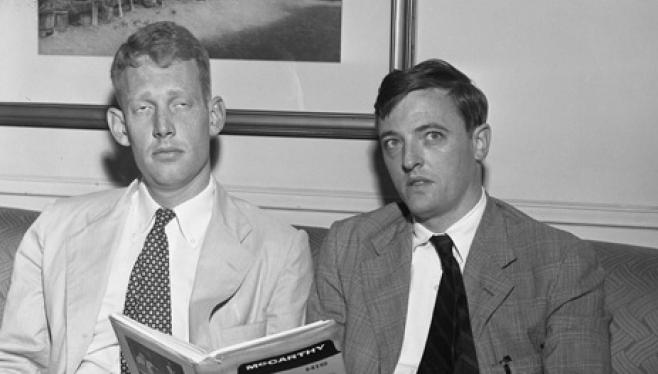
Bozell would go on to found a truly radical Catholic magazine in the late 1960s called Triumph. We hope to speak much about Triumph in the future.
Let me say for now that I find Bozell’s writing for Triumph profound. I do not use that word lightly. Here is why he joins Tomberg and Belloc in my circle of ‘dead best friends’. Like them, Bozell revealed acute moral sensitivity to the dehumanising processes engulfing the West.
These are barbarising processes and reading Bozell, one senses he wrestles with this barbarism on a daily basis – thoroughly questioning himself and what he must do. From this moral struggle, he feels propelled to radically call his whole life into question.
Mustard Seeds collects many of Bozell’s articles from Triumph and later on. Thus, it concerns a tremendous spiritual transformation.
Bozell’s Letter to Yourselves
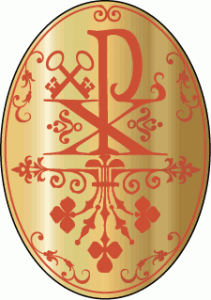
Perhaps, we can convey that transformation best by focussing on one particular Triumph piece, featured in Mustard Seeds.
That piece is called Letter to Yourselves. The Letter was written in the aftermath of Nixon’s 1968 election and Bozell is saying that anything decent in American conservatism has now been lost.
Indeed, Bozell is decisively breaking with the American Republican circles he once championed. As one commentator noted at the time, Bozell’s letter to his fellow conservatives might have been titled ‘Letter to Ourselves’.
However, Bozell has now broken with them: he is serving notice of divorce.
Bozell’s letter of divorce is a deeply-searching enquiry into the American malaise and why he feels compelled to change.
Essentially, his argument turns on the notion that the conservatism he once embraced is only another form of liberalism: right-wing liberalism, if you like. There is, Bozell asserts, an:
illusion of an essential dichotomy, between conservatism and liberalism: the belief that they differ significantly in the things that matter.
What Bozell means – to speak in contemporary terms – is that it matters not whether it is the right wing liberalism of a George Bush or the left wing liberalism of a Barack Obama. Both belong to the liberal trajectory of recent centuries. And both are leading us to barbarism.
Why is this so? Bozell’s answer is that both the right and left wings of liberalism are linked, inasmuch as they share a common parent – the post-Renaissance and Enlightenment ideal of self-fulfilment. And according to Bozell, it is precisely this shared ancestry which dooms them:
[This] parent ideal of self-fulfilment … emerged as a modern, essentially un-Christian notion, from the Renaissance – which was concerned with the fulfilment of the natural self; and any way you slice it, concentration on the natural self, at the expense of the supernatural self, tends to concentration on the physical self: on the appetites of matter. This is because man’s fallen nature, unsupported by grace, tends to animal hood [Italics mine].
From this it follows that, for at least four centuries, the politics of the West has been built on a pernicious falsehood. Thus, we are drifting toward an ever more inhuman – animalistic – society. (Perhaps today I should say hurtling.)
It is nothing less than a new age of barbarism and Bozell’s moral horror of this dehumanisation fills not only his ground-breaking Letter to Yourselves, but the whole of Mustard Seeds.
And speaking very personally dear Reader, I am reading Bozell’s acute moral anguish in the 1960s and it seems incredibly prescient. He predicts the horror we are going through now. Reading him today, nearly half a century later, I cannot help but feel: ‘He told us so. But we didn’t listen.’

Bozell, however, is more nuanced than my last, perhaps too acid remark: He readily acknowledges we have an excuse for not registering liberalism’s inevitable destination. For he maintains it has not been easy to recognise the inherent dangers of liberalism, as we have been: ‘living off the capital inherited from institutionalised Christianity.’
All this is tied to the liberal supposition that:
The spiritual dimension could be sustained and moral discipline imposed by the naked strength of the individual.
But this convenient fiction can no longer be maintained:
In the light of the gradual erosion of Christian institutions over the past hundred years, and their precipitous collapse more recently.
Moreover, Bozell accuses liberalism of a hidden elitism which has betrayed the common man. He writes:
The main trouble with liberalism is that it was designed for an intellectual and moral elite – for men who could (or thought they could) take care of themselves [Italics mine].
For whilst liberalism has proclaimed that the spiritual dimension to human culture could be maintained by individualism – the private sphere – this has only provided something for:
A moral elite to realise in their private lives, but has not been accessible to the generality of men and thus has ceased to shape and influence the public life of the West.
To put it somewhat differently, liberal suppositions that we have long accepted (e.g. that the Church could be divorced from the State without moral consequence, that Christianity did not need protection by the State, that censorship laws could be relaxed etc.) were based on a subtle elitism by which perhaps a few men could fend for themselves – but the vast majority of humanity would fall prey to the wolves …
Foreword for Monarchy by Roger Buck
Bozell on the Public Life
The result has been an increasingly agnostic public life – political and cultural – filled with barbarism. Abortion and pornography are amongst the most obvious examples here – but right across the board we see a public life that is ever more decadent. (Personally, I think of things like the board game Monopoly. Is it as grievous as the sexual gratuitousness we now see everywhere? Possibly not. Is it therefore innocent and without effect on the young who grow up playing it? Decidedly not.)
Here it may help to clarify what Bozell means by the public life. Helpfully, he defines it as:
Whatever is not the interior life. This means … family and school, play and work, art and communication, the order of social relationships and the civil order.
All these have been failed, in recent centuries, by a liberal order that emancipated itself from the Church. Once the public life of Christendom reflected Christ and His Church. Now it reflects secular values which readily facilitate things like Playboy or Monopoly. (Not to mention Beavis and Butthead or The Texas Chainsaw Massacre …)
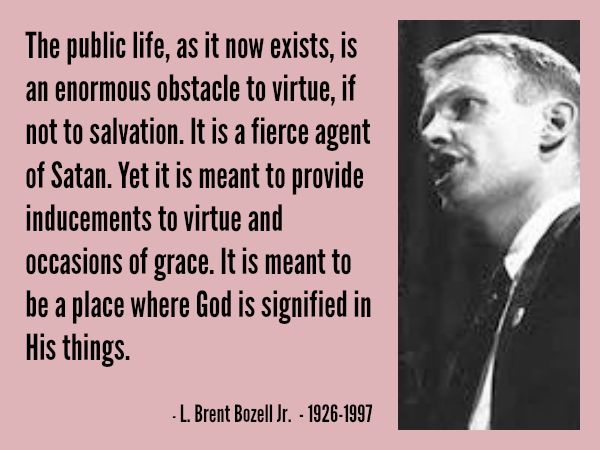
O Brent Bozell! All this you witnessed to so acutely in the 1960s – as did Belloc and Tomberg in the decades before you. People mock you as alarmist and extremist? Not I. From where I stand, you were a prophet. And the situation only deteriorates with every passing year …
But coming back to Letter to Yourselves, I turn to a fiery passage, wherein Bozell addresses his former fellow conservatives, declaring the moral bankruptcy of the vision he once shared with them:
The fatal flaw … shared by both branches of liberalism … is to assert and reassert, man’s ability to fulfil himself by himself: to assert, and reassert, his self – sufficiency. Which is denied by Christ who says. Without me you can do nothing.
I do not doubt that those of you who are Christians accept this teaching of Christ’s. But I do question whether most of you as public men, take it seriously. I can believe that it seriously affects your private lives, but I deny that it has deeply invaded your politics.
This is curious because you would have curious private lives if they were not profoundly influenced by the public thing around you.
You get all the support you need from direct approaches by God to your interior life, from private prayer, from the Sacraments? If you do, the huge generality of men, including me for one, does not.
The public life, as it now exists, is an enormous obstacle to virtue, if not to salvation. It is a fierce agent of Satan. Yet it is meant to provide inducements to virtue and occasions of grace. It is meant to be a place where God is signified in His things.
(Note: I broke Bozell’s longer paragraph here into shorter ones and will continue like this. Long paragraphs can be hard to read on computer screens and I hope readers can more easily follow Bozell this way.)

Christian Politics – the Politics of the Poor
It is not hard to imagine where Bozell proceeds from this in Letter to Yourselves. Healing the public life requires not only discarding liberal politics, whether right or left, but calls for something very different: Christian politics.
What Bozell means by Christian politics, however, requires elaboration. It is concerned not with method (eg. political parties or candidates) but, rather, an entirely different starting point than liberal self-fulfilment.
For Bozell, that starting point is compassion for the poor. But what Bozell means by the poor is not restricted to their material poverty. It also takes into account cultural poverty.
Here, Bozell draws from the French Cardinal Jean Danielou:
The essential character of the gospel is to be the religion of the poor … those who form the great mass of mankind. …
On this view of the matter, the Church was most truly itself in the days of Christendom whn everyone was baptised and it is this state of affairs which is much to be desired …
The extension of Christianity to an immense multitude, which is of its very essence, was held back during the first centuries by the fact that the social cadres and cultural forms of the society in which it operated were hostile to it.
To cleave to Christianity called then for a strength of character of which the majority of men are not capable.
When the conversion of Constantine removed these obstacles the gospel was made accessible to the poor, that is to say, to those very people who are not numbered among the elite. The man in the street could now be a Christian.
Far from distorting Christianity, this change allowed it to become more truly itself, a people …
Harkening to Danielou’s call to care for the poor, Bozell adds:
In short, it was found that for the great generality of men a Christian civilisation was the indispensable medium for communicating the Christian message [Italics mine].
For most men, as McLuhan would say, the medium was the message.
And so it is today that a Christian people is to be found only where the vestiges of Christian civilisation still exist. Danielou mentions ‘Britanny and Alsace, Italy and Spain, Ireland and Portugal, Brazil and Columbia.’
There are a few other such places, but the lesson of two millennia is clear. It is practically impossible for any but the militant Christian to persevere in a milieu which offers him no support.
This is why there is laid upon the Church a duty to work at the task of making civilisation such that the Christian way of life should be open to the poor.
This is why the Church of the Poor as she has proudly described herself through the centuries, is once again called upon to provide and teach a Politics of the Poor.
Christian politics, then, aims to reverse the liberalising trajectory of recent centuries. For we clearly see, now, where this train is headed: increasing agnosticism, atheism, materialism – leading to barbarism.
Christian politics, then, is marked by care for the poor in spirit – the vast majority of us!
For Bozell, this means caring for what I might call cultural schizophrenia. For schizophrenia easily emerges when men can know Christ in their interior life, whilst having Christ denied in the exterior, public life. As Bozell writes:
Christianity sees the public life, which is the responsibility of politics, as an extension of the interior life. As Danielou puts it, there can be no radical division between civilisation and what belongs to the interior being of man [Italics mine].
Liberal politics, by contrast, is indifferent to the connection. John F. Kennedy became the liberal par excellence by announcing that his religion would not effect his presidency because it was ‘a private affair.’

A Digression into Catholic Ireland
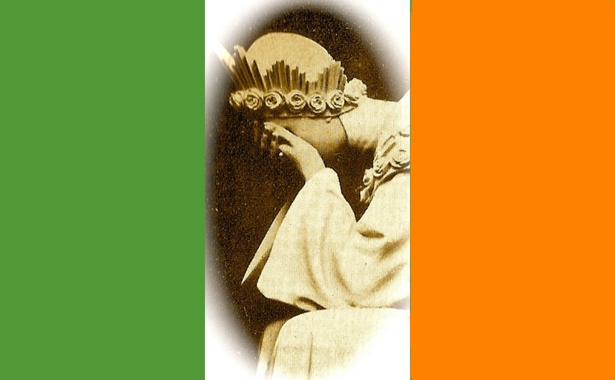
If Christ is at work in the depths of the human soul, it follows that Christ must be signified in the cultural and political life. At least, if we wish to avoid what I just called ‘cultural schizophrenia’.
In 1960s America, however, this was a radical notion. It is even more radical there today. Back then, though, it was not radical in two Catholic countries particularly dear to Bozell: Catholic Ireland and Spain.
Dear reader, allow me to digress. For I write these lines from Ireland and the people of the Irish republic once democratically opted for the Christian politics Bozell calls for!
Thus in 1937, the people voted for a new constitution, drafted by Prime Minister Éamon de Valera, which rooted ultimate authority not in the ‘consent of the governed,’ but rather the Trinitarian God of Christianity. Its preamble reads:
In the Name of the Most Holy Trinity, from Whom is all authority and to Whom, as our final end, all actions both of men and States must be referred,
We, the people of Éire,
Humbly acknowledging all our obligations to our Divine Lord, Jesus Christ, Who sustained our fathers through centuries of trial,
Gratefully remembering their heroic and unremitting struggle to regain the rightful independence of our Nation,
And seeking to promote the common good, with due observance of Prudence, Justice and Charity, so that the dignity and freedom of the individual may be assured, true social order attained, the unity of our country restored, and concord established with other nations,
Do hereby adopt, enact, and give to ourselves this Constitution [Italics mine].
My digression here is not irrelevant. Bozell had a very deep love for Ireland and in the pages of Triumph magazine regularly wrote about her. He knew 1960s Ireland to be a place where Christ was still signified in the public life. And there are further reasons for this digression, which will become evident momentarily.
Becoming Radical in America …
Of course, Bozell was not writing for the Irish but 1960s Americans, who were bewildered by his radical turn from the conservatism of William F. Buckley’s National Review. Bozell knew, however, that many of his subscribers came from National Review! Unsurprisingly, Triumph‘s circulation dropped precipitously as Bozell radicalised and courageously challenged his readership.
In Letter to Yourselves, he anticipates his American critics, who, obviously, will scarcely understand his call for the America political order to emulate Ireland with clear signs of Christ and his Church.
Unrepentant, he declares:
The public life cannot provide support for the poor unless it provides sensible expressions of truth and beauty and love – unless it sets us sensible signs of the divine.
He then proceeds to deal with the predictable objections, one-by-one.
You complain that such signs will always be miserable simulacra of what they signify? You are really complaining about the fallen nature of man, about which God has also complained.
You will therefore not be so presumptuous as to try to cast the city of man into a reflection, however distorted, of the City of God? Then you are abandoning the City of Man, as the Incarnate God did not.
You wish to limit the power of those who wish to administer to the public life because of the human tendency to issue power? You are right to do so. But five centuries of liberalism have infallibly taught that for all its contrived constitutions and laws the one thing liberalism does not provide is effective limitations on power.
Has power ever been eliminated effectively in the West except on God’s authority? Is there any better protecter of the poor, on the showing of history, than the Church of the Poor?
O what can I say, dear Brent Bozell? You are right, there is no greater defender of the Poor – materially and spiritually – than the Holy Church. And, for that very reason, the Church is mercilessly attacked by the liberal-secular order. But few in your day saw how severe the attack would become.
I am happy to repeat it: You were a prophet …
Bozell on the Death of the Constitution
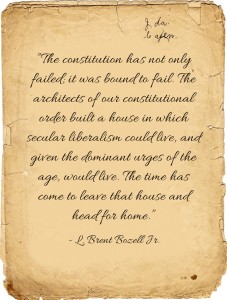
Whilst Letter to the Poor amply testifies to Bozell’s far-reaching break with mainstream American conservatism, we cannot ignore another powerful piece in Mustard Seeds of the same ilk.
That piece is titled Death of the Constitution. For the sake of non-American readers, I point out the U.S. Constitution has achieved quasi-religious status within much of American society. Thus, the founding fathers who gave birth to the Constitution are venerated as authors of sacred writ.
Bozell had once himself subscribed to this kind of constitutionalism – so much so that he spent five years researching and writing a major work (The Warren Revolution) which defended the constitution against its usurpation by judicial review.
However, Bozell – he who had devoted long years of his life to constitutional defense – now turned 180 degrees: He openly attacked the U.S. constitution as ireedeemably flawed!
On can only imagine the shock his brother-in-law Buckley and former fellows at National Review must have felt. What Bozell was saying would have seemed tantamount to apostasy! Bozell had become a heretic to the American religion.
Although we cannot unpack Death of the Constitution in the same detail as Letter to Yourselves, something must be stressed here. Bozell’s radical transformation turns on the issues that emerged for him as he first studied and defended the US Constitution – and then gave up on that constitution as indefensible.
Two issues or arguments – life changing for Bozell – feature prominently in Death of the Constitution.
The first is that Americans, even whilst they venerate the founding fathers, no longer really care what they think. For example, it was obvious to Bozell – as a dedicated student of constitutional law – that the founding fathers would have abhorred abortion. But that didn’t prevent Roe vs. Wade …
Today, of course, the same is true of gay ’marriage’ in America. One knows the founding fathers never intended gay marriage. But gay marriage has just been imposed on Americans by judicial fiat in America! That is to say, justified on the putative basis of the constitution.
Something is rotten in the state of America’s constitutionalism – and Bozell recognised the rot long ago.
However, this first issue – the betrayal of the founding fathers – was actually less important to him than a second one, which convinced him even more deeply to abjure his former faith in the U.S. Constitution.
Unsurprisingly, this issue is connected to the matter of Christian Politics. As Bozell continues:
The Declaration of Independence … stated flatly and unequivocally the principal of authority under which the adopters of the federal Constitution performed the act of sovereignty that set up the American Republic.
Governments, the Declaration asserts, derived their just powers from the governed.
The Christian principle of authority by contrast, asserts that all power is derived from God.
As Pope Leo XIII formulated the principle in Immortal Dei, Every civilized community must have a ruling authority, and this authority, no less than society itself, has its source in nature, and has, consequently, God for its Author. It follows, then, that all public power must proceed from God [Bozell’s italics].
Is it possible to reconcile the two propositions just noted? Christian political doctrine teaches that it is not, unless one is clearly subordinated to the other.
Authority in politics or sovereignty is the right to command human beings and therefore beings, and therefore legitimately only through participation in the authority of God [Italics mine] …
There cannot be a legitimate civil authority which is independent of the authority of God.
And this means, in turn, that if the consent of the multitude or its general will (in Rousseau’s variation) is at variance with natural or divine law – if the people’s pleasure in other words is not God’s – then the former must give way to the latter.
Either that, or the civil order is in rebellion against the divine order, and must be prepared to accept whatever consequences such rebellion may entail.
From all this Bozell concluded:
The constitution has not only failed; it was bound to fail.
The architects of our constitutional order built a house in which secular liberalism could live, and given the dominant urges of the age, would live. The time has come to leave that house and head for home.
On Secular Liberalism
Building a house in which secular liberalism could live …
The problem here is, as Bozell came to see, secular liberalism is soul-destroying. Here, in another remarkable passage, Bozell tells us why:
The central tenet of liberalism . . . is that man is on his own. His personal life is neither dependent on nor answerable to any external Authority, nor, in its own sphere, is the public order he constructs.
It follows, as the necessary antidote to disillusionment and despair, that human life and human society are perfectable by the agency of man. But since man, by himself, cannot function in the realm of matter, that search, in turn, requires experimentation under the standard of utility; thus the famous American pragmatism which may, in some circumstances, counsel rugged individualism and self-reliance, but in others, recourse to the collectivity, or to the support of technology.
Still, liberalism recognized that matter may not be everything and thus urges man to reach for the spirit—for truth: on the understanding, however, that one man’s reach is as good as another’s (. . . relativism): and on the consequent understanding that any affirmation of Truth must be denied (. . . nihilism).
The Confessional Tribe
Having considered Letter to Yourselves and Death of the Constitution, it is time we turn to a third major piece: The Confessional Tribe.
This piece is later and even more radical than the above. For in the first two pieces, Bozell is diagnosing the malady of American conservatism (or the right wing of liberalism).
Here, however, he proceeds from diagnosis to cure. He outlines the ideal kind of Christian society he would have.
We are going to quote from it in depth. But hang on to your hat, good reader! What follows is a stunningly radical in terms of the twenty first century Anglo-American world. It goes everything we have been led to believe. What I am about to quote is enough to incite many of my fellow Americans to the thought of burning books!
I say this as an American myself, who is now living in Ireland.
And here is further reason for my invoking Ireland. Because although most Americans will automatically regard what Bozell’s writes as indefensibly wrong, it was not wrong in Ireland, even fifty years ago. For Irish people back then what Bozell is saying was only natural. And, moreover, they democratically opted for it!
We have already seen how Ireland democratically voted for de Valera’s constitution which placed ultimate authority in God. We now add that for the Irish of that era the first amendment of the U.S. Constitution sharply separating Church and State would have seemed counter-intuitive.
Click to buy from Amazon Worldwide!

Moreover, the Irish people, rooted in Catholic values, repeatedly elected governments which passed legislation enforcing Catholic values. (For example, laws were passed excluding divorce and the sale of contraceptives.)
Many Irish also prided themselves on the fact that their censorship laws were much stricter than England’s. Long ago, British things once carried the label ‘banned in Éire’ to signify their salacious content. (Salacious, that is, by the standards of the day. By today’s barbarised standards, they would seem innocent indeed.)
‘Ah, I see!’ today’s Anglo-American liberal may conceivably exclaim. ‘The key verb above is ENFORCE. Catholic Ireland must have been fascist, enforcing things like that!’
Be careful, if that is your gut reaction, dear Reader. Because today’s Anglo-American (and now Irish) liberal world likewise enforces things – things like gay ‘marriage’. (And it comes down heavily on the various butchers, bakers and candlestick makers who refuse to service the new ideology!)
The difference between Catholic Ireland and secular-liberal Ireland, then, is that one legislates for Catholic values, whilst the other legislates for secular-liberal values.
The Christian City – or State
I say all this to help ease the shock of what follows or at least the shock it may elicit in those who believe (consciously or unconsciously) that the twenty-first century secular liberalism is the only legitimate template for society.
For Bozell has argued that increasing cultural decadence comes down, in large measure, to secular liberalism. It follows that his antidote to cultural decadence is renouncing secular liberalism and, as he puts it, ‘to build a city hospitable to Christian living.’
And so Bozell outlines his vision for the Christian city. (The fact that Bozell speaks of a city here rather than a Christian state is probably in reference to The Secular City by Harvey Cox – a 1960s book praising secularisation.)
Here, then, is Bozell’s sweeping vision of a society that has discarded the sacred cows of secularism. However, discarding secularism does not spell fascism. For de Valera’s Ireland’s proves that a society can democratically choose not to be secular. And, no doubt, Bozell’s love of Catholic Ireland partly inspired the vision Bozell outlines here:
The first citizen of the city would of course be the Church. She would not govern directly the way a President or Congress does, but she would be the anchor for the whole public thing.
Her articulation of divine and natural laws would be the constitution of the city with which any human legislation would be expected to comport. Her ceremonies and feasts, her penances, would set the rhythm of the public life. Her art and music would fill the streets of the public life. Her compassion for sinners and for suffering, would shape the soul of the public life.
She would invite the poor, whether in spirit or in body, to seek mercy and justice from the Church of the Poor. She would invite the rich to seek poverty in the Church of the Poor. She would do all of her tasks imperfectly, but the city would know that without her it would go adrift. The city would not have a First Amendment.
The city would be built around the family, in the way that physical cities in Christendom were built around a church. Families would thus be hallowed ground, sanctuaries. They would be respected as temples in which the union of love and life are consummated: Breaking them, or breaking into them would call the city to arms.
The city’s weapons would be varied. It could not hold man and wife to love; but it would, by denying legal sanctions to divorce and furnishing social sanctions to discourage it, fortify the place where children learn love from living with their parents.
It could not prevent the divorce of love from life in the sex union; but it would exclude contraceptive wares from the public commerce and exclude inducements to them in the public conversation.
It could not in every case protect those innocents who have gained entrance to the family by gaining life; but it would save for any known abortionist the coldest fury of the public justice.
It could and would assure peace to the family: the peace of privacy, the peace of independence, the peace of freedom in the rearing and training of children. The city would be traced, however inexactly, in the footsteps of the Holy Family.
The city would view life as primarily a training ground for sanctity. Therefore its primary institution after the Church and the family, would be the Christian school. It would not maintain any other kind of school.
It would understand that the formation of the young is an indivisible undertaking from hearth to schoolroom, and that to deny the young a Christian formation is to cheat the young.
It would respect a family’s right to form its children otherwise, but would not, on the public account, contribute to the injustice.
It would recognize that any school which excludes Christianity form its curriculum, indeed from any field of study, quite simply falsifies reality- and thus conspires to entrap the young in an unreal world …
As the school would form a man’s mind and character in a Christian mold, so the city’s other social arrangements would help him practice Christianity. Sanctity is a state of being, and all that it requires is an unobstructed view – Blessed are the pure of heart for they shall see God.
The view is obstructed however, by a political system that substitutes power for charity, justice and mercy. It is obstructed by an approach to science and technology that enslaves man to his artefacts. It is obstructed by an approach to work that withholds from man the opportunity for leisure, for the enjoyment and contemplation of existence.
It is obstructed by ugliness, which hides from man God’s beauty.
So the city would seek to remove such obstructions; it would offer, in every aspect of the public life, sensible supports for the virtues taught in family and school.
Perhaps a pause is needed here to allow the astonished reader to catch his breath …
For whilst I know well that this illiberal credo is bound to outrage, those who feel outraged fail to take in a key point that Bozell also makes in The Confessional Tribe. It is this: the final terminus of secular liberalism is illiberal itself!
The outraged, in other words, have failed to attain the insight that Bozell puts thusly:
As long as the American political order was in fact ‘pluralistic’… the city’s government could be considered legitimate, and could legitimately exact from Christians as well as other the duties of citizenship. But that condition no longer holds. Pluralism in America today is a fraud: there is no Christian presence inside the city, none is permitted. The King is now outside the walls, and it is there that his subjects must gather.
So it was in 1960s America. So it is today, throughout the West, including modern secular Ireland, which likewise pretends to be pluralistic …
The Rest of the Book …
We have spent considerable time on three pieces: Letter to Yourselves, Death of the Constitution and The Confessional Tribe. But these are only three articles – among 47! – that make up Mustard Seeds. Together they account for only ten per cent – forty pages of nearly 400 in the book!
Now, not every article is as searching or profound as these two – although a good number are. Nor do all of them concern the same themes. Bozell addressed numerous other topics, including liberalism in the Church and – most poignantly – the unfathomable mercy of God, as he wrestled with bipolar disorder.
Bozell also wrote extensively about the political events of his time, including the Vietnam war, Watergate, the legalisation of abortion in America and the rise of Solidarity in Poland. Throughout it all is trenchant analysis – once again, prophecy – as to the creeping fascism of secularism.
Perhaps I have been somewhat one-sided in focussing so much on these three key articles – although, to me, they seem to represent the core to Bozell’s transformation and much of his thinking.
From Roger Buck, co-author of this site. Click to buy from Amazon worldwide!

Hilaire Belloc and Valentin Tomberg
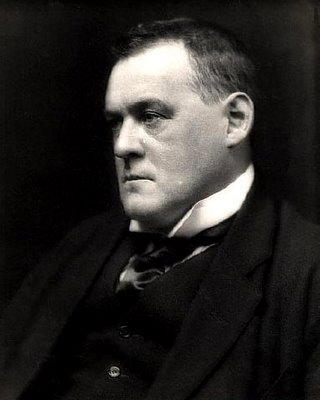
Beyond what I call these three ‘core’ pieces, we will not say much of the remaining 44. However, I cannot resist passing reference to one article, that is particularly relevant to this website.
Regular readers will know my devotion to the great Hilaire Belloc. Bozell appears to have a similar respect for this Catholic genius. And one essay, The Servile State Revisited, not only revisits Belloc’s seminal work on Distributism, but also features an imaginary dialogue between Bozell and Belloc!
It is a very helpful piece for understanding Distributism, not least because Bozell recognises the error many American conservatives made in reading The Servile State. Indeed, Bozell confesses he made the same error himself for twenty years! Because Bozell and his fellow conservatives studied the book for its penetrating critique of Socialism, but as Bozell writes:
What most conservatives did not choose to notice is that the book is also a ferocious attack on Capitalism, which Belloc regards as the worst social evil ever invented by man.
Here I would also like to make a link between Brent Bozell and Valentin Tomberg. For Bozell was a Catholic convert and lawyer thinking about politics. And Tomberg, invoked above, was another Catholic convert educated in law and the author of some stunning theses on Catholic jurisprudence and politics.
Now, I do not imagine Bozell had read the obscure Russian convert Tomberg – but Tomberg’s and Bozell’s writings on Christian politics can be profitably read together: each man’s arguments serve to re-enforce the other’s.
Indeed, I have no found no other Catholic political thinker as close to Tomberg as L. Brent Bozell, when it comes to deconstructing the poisonous effects of the Enlightenment on politics and suggesting a way forward with Christian politics. This is to say: a way back to Christendom.
In Conclusion: Bozell and This Website

Here we indicate a goal we hope to develop further as time goes by. For this website is devoted – like Bozell’s Triumph magazine was devoted – to renewing Christendom.
Indeed, I cannot help but feel I am following – or rather fumbling and bumbling – in the footsteps of Triumph. (Just as I once wrote (here) that I am also fumbling in the footsteps of Hilaire Belloc.)
It will take me years to unpack what I mean by these last statements. Here I will only say this long piece on Bozell marks a new stage in the ongoing development of my writings at this website. Here is why I unabashedly introduce L. Brent Bozell, as my new deceased friend, who has now joined my other deceased friends, Valentin Tomberg and Hilaire Belloc …
Yes, we hope to explore Brent Bozell’s legacy much more in future writings. For now, I will just say this lengthy piece will be hopefully be followed soon by another very long piece on Triumph magazine. Therein we will, of course, return to the Christian politics of Brent Bozell – but we will also honour Frederick D. Wilhelmsen his collaborator at Triumph whom we have so far failed to mention …
Tomberg, Belloc, Chesterton, Bozell, Wilhelmsen: here are great Catholic and Christian thinkers who, seeing the catastrophe of the Enlightenment, sought the road back to Christendom. My life and my writing must honour, increasingly, my growing indebtedness to these men.
A final note about Ireland: my invocation of Éamon de Valera earlier likewise has much to do with what I have just said.
For giants have walked before us and even those of us who feel very small must try to follow in their footsteps …
To support this site, please consider ordering through our links to either Amazon or Amazon UK:
Foreword for Monarchy by Roger Buck

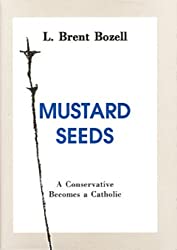
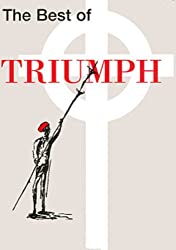
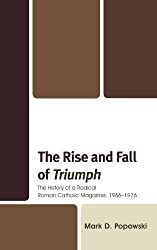
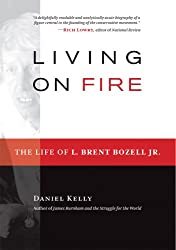






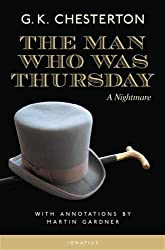

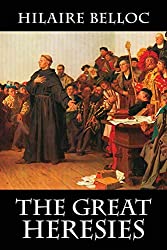
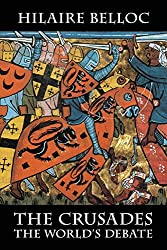
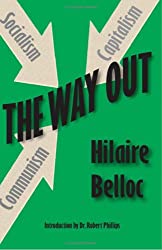
Comments
comments are currently closed
4 responses to “Mustard Seeds: A Conservative Becomes a Catholic by L. Brent Bozell (Review)”
[…] « Feast of St. Giles, Abbot Mustard Seeds: A Conservative Becomes a Catholic by L. Brent Bozell (Review) » […]
[…] then there is the late, great, but all-too-little-known L. Brent Bozell and his masterpiece Mustard Seeds (reviewed here) which I also want to draw attention […]
Roger, an excellent piece. You may remember me from the threads on this topic at the web forum Fisheaters. I am pleased to see that our discussions there have come to fruition.
Jacob, a small, terribly belated reply – one of many I am now catching up with after both weeks of illness and finalising my big book for a deadline.
Thus, I am sorry this took so ridiculously long, but I certainly remember you!
Your contributions there were most interesting and I have missed them. (I don’t know if you will have seen that I revived that long thread on Christendom College and Bozell some months ago.)
Anyway, lately, I’ve not been able to be on FE either, but do hope to return once I worked through a stack of correspondence. Hope to see you there, again!